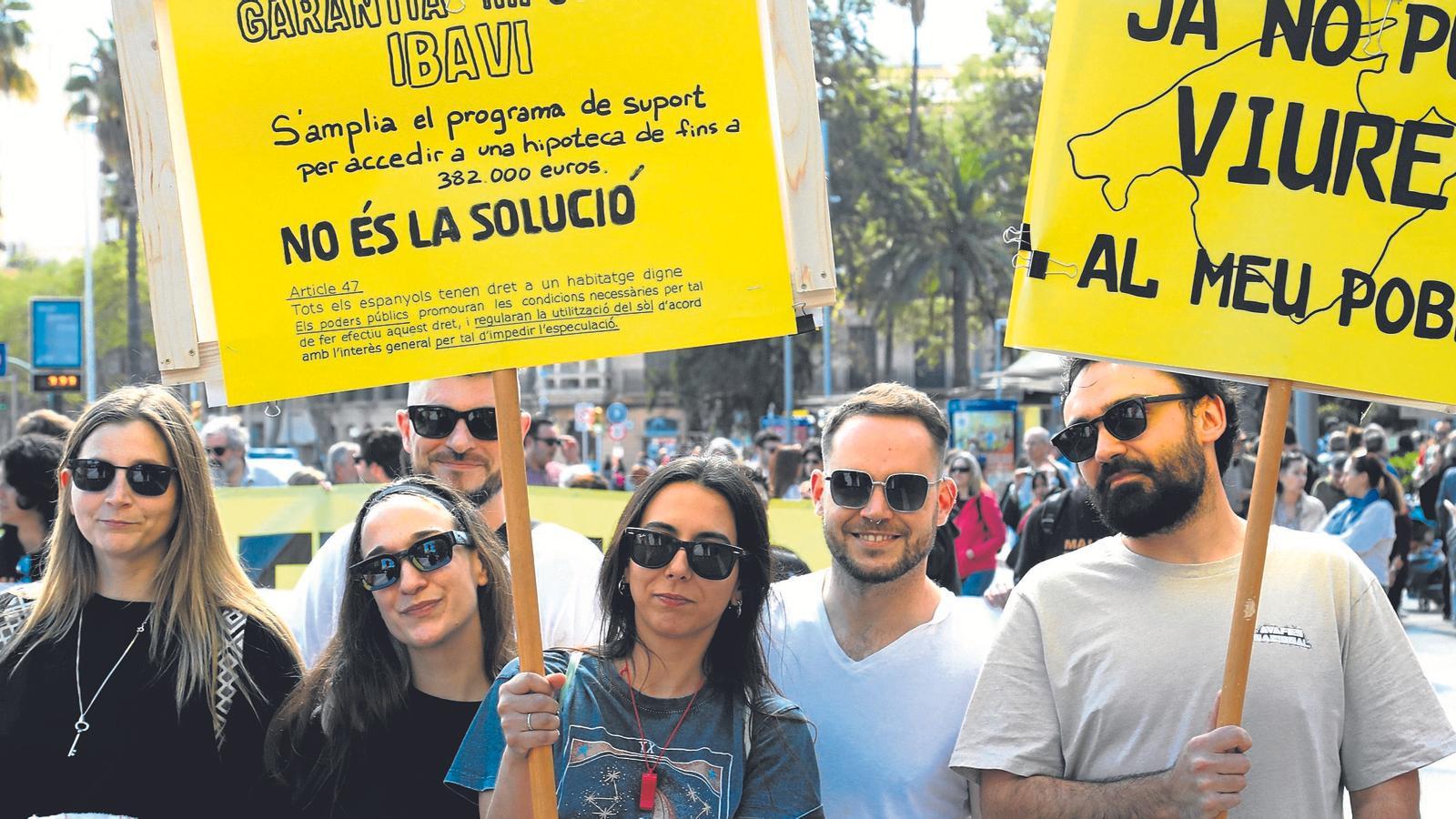"What if we went on a general strike over the housing issue?"
A more individualistic and demobilized society after the pandemic prevents the development of a mass protest movement against the housing emergency in the Balearic Islands.


PalmThe Balearic Islands are the autonomous community with the most expensive second-hand homes in Spain. For the first time, the price per square meter surpassed the €5,000 barrier. The year-on-year increase (based on May data) was 20.9%, meaning a 90-square-meter apartment has risen by €90,000 in the last year. The rental situation is equally dramatic: €19.70 per square meter, on the podium with Madrid and Barcelona, according to July data collected by the real estate website Idealista. Limited supply, high demand, the voracity of a runaway market, and the lack of policies to create a public housing stock do not bode well. The stark figures translate into a residential and social emergency that forces people to live in caravans, shacks, abandoned buildings, such as the former Palma prison, or even on the streets.
Tourist rentals—legal and illegal—which deprive residents of long-term housing has exacerbated the problem. Citizens have demonstrated against the overcrowding exerted by the human, economic, and social pressure of tourism, but the housing problem underlies the protests. If the situation is so serious, why doesn't it erupt in a massive mobilization demanding a change of course on something as essential as a roof over their heads?
Anthropologist José Mansilla acknowledges the seriousness of the problem, but doesn't believe there will be a "disruptive" citizen response. "There isn't a spark that spills over into the streets," he asserts. Among the factors for the absence of this explosion of discontent, he cites the unemployment caused by the pandemic and that "the economic growth that is finally being distributed allows us to weather the storm and get by." Sociologist David Abril agrees with the analysis of post-COVID society: "It hasn't made us better, but rather more individualistic," he asserts, referring to a situation "exploited by the far right to defend a security-oriented discourse," marked by the threat to employment and the rise in alarm installation. "There has been a cultural shift. We have gone from a logic of defending the right to housing to defending the rights of homeowners. This is no coincidence," he asserts, before bolstering the argument with a figure: "If you apply this to Balearic society, almost 100,000 people have reported rental income on their tax return." Excluded from the data are all those who close off-the-books, without a contract, and therefore not quantified. "People in rental situations are the worst off in terms of residential precariousness. They have to accept the landlord's blackmail because, if they rebel, they could face exclusion, given the state of the market," he continues.
Thousands of people demonstrated in Palma—in June 2024 and 2025—against overcrowding, "a malaise that coincides with housing discontent." But, so far, "they have a certain degree of spontaneity." "There is no collective, mass organization. Solutions to the structural problem will not come individually. Either other actors with the capacity to work and defend those who are suffering come together, or it will be difficult to find a solution in the medium or long term," says Abril, who advocates for "creating the conditions that mobilize citizens and enable them to exert pressure." At this point, beyond a large demonstration, he suggests: "Why not hold a general strike on the housing issue given the current situation?" According to the expert, this role should be played by the unions: "The paradox is that they have achieved unthinkable wage increases, but they have been swallowed up by housing prices and landlords. They are not responsible for the situation, but they, due to their capacity and number of members, are the ones with the greatest power to mobilize people."
The secretary of public policies for the CCOO (Working Council of Workers) in the Balearic Islands, Daniel Cámara, responds to the idea of a general strike with a "hopefully," but warns: "When you call one, you must win it. If not, you show weakness. You have to build first." How should residents who have seen housing prices rise 200% in ten years, when salaries have only risen 23%, be motivated? "With a lot of pedagogy. Unions work to build a social response with a sociopolitical discourse that makes people understand that workers' conditions depend not only on direct wages, but also on indirect wages, such as energy, the shopping basket, and housing, among others. We do this when we explain collective bargaining agreements in the workplace."
Unions are facing "a cultural and political defeat that has bought off part of the working class." "It's becoming increasingly difficult to organize people. In part, because there's a campaign against what the union movement stands for. Hence the rise of the far right among humble people who vote against their interests. We're not at a peak of progressive ideas, of defending common interests. We must go on the offensive." The CCOO (City of Workers' Workers' Party) proposes creating a public investment fund to acquire foreclosed or vulture fund housing and incorporate it into the public housing stock. "It would have a secure, limited return, with guarantees from the government, and would also serve to build," asserts Cambra, who believes that "Prohens and Vox are not serving the general interest because they don't declare tense areas and legislate for developers and speculators." "Housing, the most impoverishing element for workers, must be publicly controlled," he adds.
Opaque Policies
Gloria Olmos, a lawyer and collaborator with the Platform of People Affected by Mortgages (PAH) in the Balearic Islands, believes that citizen mobilization should be "more intense and demanding" in response to the measures announced by the government: "They are policies to benefit the interests of the elite, opaque, with land rezoning, without having to have... and demand compliance with the law on issues like evictions. It seems politicians are unaware of the problem."
Social movements in defense of decent housing "move masses, but with technical assistance," believes anthropologist José Mansilla. "There are no longer activists, but people who advise you and you go because it affects you personally, because they are going to solve your problem. They do important work, but it takes time to make the leap to a transversal movement that draws people in. They don't act as multipliers of discontent," unlike what happened a few years ago "when the problems were solved." The diluted effect of the 15-M movement hasn't helped. "Nor has politics," he adds. Young people also tend toward individualism. "Beyond issues like environmentalism or feminism, it's a tired, disillusioned generation that doesn't identify the housing problem as a collective one. They end up developing individual strategies because society is much more complex," he continues, venturing that the arrival of the PP to the Spanish government "with the support of Vox" will generate a capacity. "Working-class people who vote for the right out of rebellion will see that the problem can't be solved, and their message will no longer articulate the discontent," he opines. Meanwhile, "a hedonistic drift" is occurring among young people: "The idea is 'since I can't buy a house, I'll spend everything and live as long as I can.' It fits with individualism."
